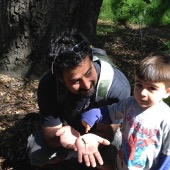Aguilar, Andres

Andres Aguilar
Dr. Andres Aguilar is a California State University, Los Angeles professor in the Department of Biological Sciences. His research focuses on evolutionary and conservation genetics, and he teaches courses on introductory biology, evolutionary biology, and conservation biology. In his research lab, Dr. Aguilar investigates Conservation Genetics, Population Genetics/Phylogeography, and Genomics. Dr. Aguilar continues to work in the environmental field because he enjoys the research questions that arise. He believes the unique aspects of research questions can inform planning and policy for resource and conservation management. He also believes that teaching is gratifying because it enables him to help students become more engaged in conservation biology issues.
A. Aguilar, G. Roemer, S. Debenham, M. Binns D. Garcelon & R. K. Wayne. 2004. High MHC diversity maintained in an otherwise genetically monomorphic mammal. Proc. Natl. Acad. Sci. USA. 101: 3490-3494.
A. Aguilar. 2006. Analysis of FST outliers at allozyme loci in Pacific salmon: implications for natural selection. Environmental Biology of Fishes. 76: 329-339.
A. Aguilar, D. Jesup, J. Estes & J. C. Garza. 2008. The distribution of nuclear genetic variation and historical demography of sea otters. Animal Conservation. 11: 35-45.
A. Aguilar. 2012. Range-wide and local drivers of genetic structure in an endangered California vernal pool endemic crustacean. Conservation Genetics. 13: 1577-1588.
A. Aguilar, R.B. Douglas, E. Gordon, J.D. Baumsteiger, & M.O. Goldsworthy. 2013. Elevated genetic structure in the coastal tailed frog (Ascaphus truei) in managed redwood forests. Journal of Heredity. 102: 202-216.
Born August 13, 1974, in Los Angeles, Andres Aguilar became interested in environmental science as a young child when his father took him on fishing, camping, and hiking trips—his time spent fishing, particularly, sparked his interest in marine science and ecology. This interest remained with Dr. Aguilar after completing high school and being accepted at Humboldt State University. While an undergrad, during one summer, Dr. Aguilar had his first environmental job conducting research for the University of California, Davis research program in ecological toxicology. Dr. Aguilar credits this program as providing him with an excellent introduction to scientific research and further influenced him to pursue a career in the environmental field.
In 1997, Dr. Aguilar completed his studies at Humboldt State University and received a BA in biology. He obtained his Ph.D. in biology at the University of California, Los Angeles (UCLA) in 2003. Afterward, he did postdoctoral work at the University of California, Santa Cruz, for the National Marine Fisheries Service from 2003-2006.
Dr. Aguilar cites completing his Ph.D. as one of his biggest challenges because the intimacy of working on one’s research can be lonely and draining. However, completing his degree led him to land his first dream job at the University of California Merced. In 2006, Dr. Aguilar became an Assistant Professor at the University of California Merced.
In 2013, Dr. Aguilar became a faculty member in the Department of Biological Sciences at California State University, Los Angeles. His research focuses on evolutionary and conservation genetics, and he teaches courses on introductory biology, evolutionary biology, and conservation biology. His current projects include: investigating genetic variation in small or declining populations in redwood forest amphibians, studying the genetic structure and the genetic basis of adaptation (physiological & morphological) in California freshwater fishes, and generating sequence data from expressed sequence tag libraries from rockfish multiple (Sebastes) species.
While his career is very meaningful, Dr. Aguilar considers his family his biggest achievement in life.
Dr. Aguilar’s success is partly due to the outstanding guidance he received from several mentors over the years. One of those mentors, Dr. Jacob Varkey, a genetics professor, assisted Dr. Aguilar during his undergraduate term. Dr. Aguilar states that Dr. Varkey urged him to go into scientific research and pursue many field opportunities. Dr. Aguilar’s role model at UCLA was Dr. Scott Edwards, a successful scientist in Dr. Aguilar’s field. Dr. Aguilar’s postdoctoral advisor, Dr. John Carlos Garza, was also an important mentor to Dr. Aguilar, helping him present his research at symposiums and conferences.
In turn, Dr. Aguilar mentored many minorities who sought to become Ph.D. students and later faculty members in the environmental field. At CSULA, Dr. Aguilar is a mentor in the MORE (Minority Opportunities in Research) programs. This program aims to “enhance the development of minority students who wish to pursue research careers in basic science disciplines, mathematics, and engineering” by providing them with valuable research opportunities and the guidance of faculty mentors. Dr. Aguilar is also a member of the Society for the Advancement of Chicanos and Native Americans in Science (SACNAS), a society of professional scientists that offers support, career development, and research prospects to fellow members. Dr. Aguilar has been a part of this professional association since graduate school. He spoke at their annual meetings and engaged in other informal mentoring activities. He continues to seek out underrepresented students interested in ecology and related fields and encourages them to work in his lab.
Dr. Aguilar has continued to work in the environmental field because he enjoys the research questions that arise. He believes the unique aspects of research questions can inform planning and policy for resource and conservation management. He also believes that teaching is gratifying because it enables him to help students become more engaged in conservation biology issues. For students of color considering a career in the environmental field, Aguilar emphasizes the importance of “taking advantage of all opportunities as soon as a student possibly can. Scientists can oftentimes get stuck in the pre-medicine or biomedical route, but if students can take advantage of other opportunities, they will be able to explore many other scientific fields.”
Interview conducted by Multicultural Environmental Leadership Development Initiative staff. 2016. University of Michigan – School of Natural Resources and Environment. Ann Arbor, MI.
Aguilar Lab. https://andresaguilar.weebly.com/